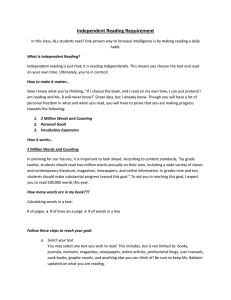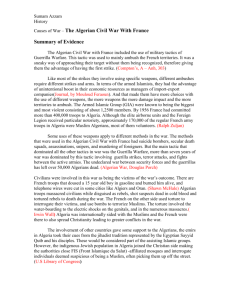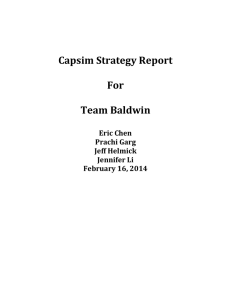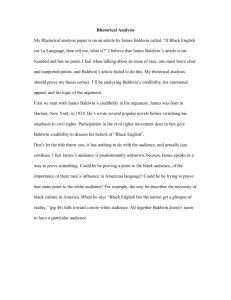VALÉRIE K. ORLANDO
advertisement
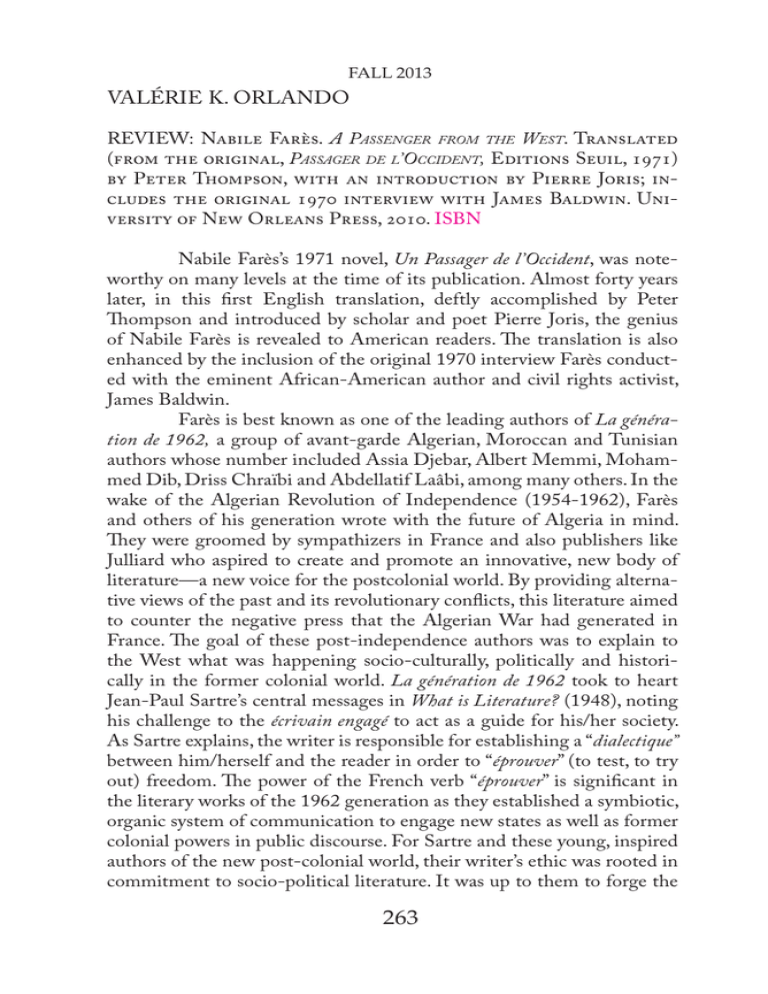
Fall 2013 VALÉRIE K. ORLANDO REVIEW: Nabile Farès. A Passenger from the West. Translated (from the original, Passager de l’Occident, Editions Seuil, 1971) by Peter Thompson, with an introduction by Pierre Joris; includes the original 1970 interview with James Baldwin. University of New Orleans Press, 2010. ISBN Nabile Farès’s 1971 novel, Un Passager de l’Occident, was noteworthy on many levels at the time of its publication. Almost forty years later, in this first English translation, deftly accomplished by Peter Thompson and introduced by scholar and poet Pierre Joris, the genius of Nabile Farès is revealed to American readers. The translation is also enhanced by the inclusion of the original 1970 interview Farès conducted with the eminent African-American author and civil rights activist, James Baldwin. Farès is best known as one of the leading authors of La génération de 1962, a group of avant-garde Algerian, Moroccan and Tunisian authors whose number included Assia Djebar, Albert Memmi, Mohammed Dib, Driss Chraïbi and Abdellatif Laâbi, among many others. In the wake of the Algerian Revolution of Independence (1954-1962), Farès and others of his generation wrote with the future of Algeria in mind. They were groomed by sympathizers in France and also publishers like Julliard who aspired to create and promote an innovative, new body of literature—a new voice for the postcolonial world. By providing alternative views of the past and its revolutionary conflicts, this literature aimed to counter the negative press that the Algerian War had generated in France. The goal of these post-independence authors was to explain to the West what was happening socio-culturally, politically and historically in the former colonial world. La génération de 1962 took to heart Jean-Paul Sartre’s central messages in What is Literature? (1948), noting his challenge to the écrivain engagé to act as a guide for his/her society. As Sartre explains, the writer is responsible for establishing a “dialectique” between him/herself and the reader in order to “éprouver” (to test, to try out) freedom. The power of the French verb “éprouver” is significant in the literary works of the 1962 generation as they established a symbiotic, organic system of communication to engage new states as well as former colonial powers in public discourse. For Sartre and these young, inspired authors of the new post-colonial world, their writer’s ethic was rooted in commitment to socio-political literature. It was up to them to forge the 263 METAMORPHOSES new parameters of a decolonized consciousness. Yet, as Farès’s novel reminds us, with respect to Algeria in the years following independence, public “engagé” discourse became increasingly viewed as threatening by the postcolonial Front de la libération (FLN, National Liberation Front) government. Many authors, Farès included, were forced into exile, cheated out of the great Marxist-Socialist ideals of freedom and democracy touted by revolutionary leaders and ideologues who had fought against the French colonizers. Indeed, A Passenger from the West is a novel of and about exile. This semi-autobiographical work is the story of a journalist, Brandy Fax, who like Farès, has been forced to leave Algeria primarily because of failed revolutionary ideologies. As early as the mid-1960s, Farès realized he was a man without a country—a realization that has unfortunately remained true for a lifetime. Algeria, from independence forward, has been factionalized by the “patriarchy of Algeria.” A failed multi-party political system and compromised freedom of speech (particularly for those who are francophone), have been the primary legacies of Algerian independence (Farès 73). As if predicting the future of the Algerian civil war and the rise of Islamic radicalism in the 1990s, Farès suggested in his 1971 A Passenger from the West that “this idea that only the Islamic Father exists” would one day rule the land (73). Thus, the author’s novel can be read as a harbinger of what would come to Algeria in the 1980s, 1990s and even in our millennium: suppression of human rights, factionalism, murder, and war. Brandy Fax, occasional journalist for Jeune Afrique magazine, the leading news journal for francophone post-colonial Africa (still in existence today), lives in Paris as an exiled Algerian. When called by the magazine to interview James Baldwin, the great African-American author who Brandy Fax exclaims, “seemed made of everything I didn’t know about America. Black America” (29), the journalist is elated by his good fortune. Through a series of meetings and interviews with Baldwin, also exiled, Fax explores what it means to be a person of color in a world stratified by the dichotomies of racism and civil rights movements, decolonizing revolutions and postcolonial repressions. The histories of America, France and Algeria blend as literatures, languages, and geographies are scrutinized by both Fax and Baldwin in their attempt to make sense of a tumultuous world. This world is one in which they can live and survive only as nomads. Baldwin’s reflections on his life as told to Fax in a series of interviews in Parisian hotels, act as a catalyst that propels the Algerian to reflect on his own past. The City of Lights offers a haven from which both authors can briefly escape their homelands and histo- 264 Fall 2013 ries of misery. Baldwin’s American past is blended with Fax’s Algerian past in which both have seen friends die: (Baldwin): “Twenty-two years ago, in 1948, I was in Paris. Afterwards, I went back to the U.S., in 1957, and I’ve now spent thirteen years there. Now, leaving this time, it’s very serious. And they’ve killed all my friends… […] (Fax): …suddenly I saw A’moura again (that was his name) dying before the door of the gourbi where we lived, in the forest, during the filthy Algeria war. […] A’moura with shaven face, face splattered by a B26. What a mess…without understanding… […] (Baldwin): “They have killed all my friends… the only ones I had, and no longer have…. You live in Paris?” Baldwin asked. (Fax): “Yes, since 1968. October.” (Baldwin): “They have killed all my friends…and now, it’s as if I am all alone; and the world shrinks when you’re alone.” (39) October 1968, the French Cultural Revolution, is melded with America’s 1965 civil rights riots, and the assassinations of Martin Luther King, Malcolm X, the Kennedys), rendering Farès’s novel a historical snapshot pregnant with special meaning for the bilingual and bicultural French-American reader. For the same reason, A Passenger in the West is a unique narrative that requires a certain level of literary sophistication and knowledge of the past of three countries in order to understand much of its nuance and message. Although written in 1971 as a commentary on the historical moment, A Passenger in the West is a novel of immense contemporary relevance. It is, and was, a multicultural novel, promoting the cross-fertilization of languages, nationalities and ethnicities. As with the nomadic Algerian authors of the era, Farès deterritorializes and reterritorializes on/ in several nationalities/countries—Algeria, France, Spain, America—in/ from which he blends a unique global identity. The Algerian yet Frenchspeaking author, who interviews Baldwin in English, follows the trajectories of a nomad plotting points and constructing rhizomes—rhizomes between plateaus of existence. Farès was a mondialiste (global) author before we had really conceptualized the term. His nomadic life of flux 265 METAMORPHOSES allows him to construct a system of connections that ultimately lead him to a complex identity that is fragmented, yet rich, conflicted yet universal. At one moment, Brandy Fax converses with Baldwin about racism in America and the next the author/journalist is transported back to his native Algeria during the war of liberation. Fax’s jaunt to Spain with the lovely Conchita, his muse, allows him to enter a third space of negotiation where he writes of his past and present in exile. This additional exile adds yet another layer of consciousness that opens up thoughts Fax has never before explored. The exiled space of Spain, a country with which he has little familiarity, is the only place offering a means by which to access “this desire to arrive, once and for all, beyond all unhappiness…”. Fax remarks that such a place in exile allows one to speak and write: “the desire to speak, to this extent of sitting down to write, without some risk for both the written word and the writer… to attempt the marvelous, to attempt to write the marvelous…” (102) A Passenger from the West offers a glimpse through a short window of time that exposes the pasts of two countries in the eyes of two very different authors. Baldwin’s African-American reality of the 1960s is melded with Farès’s traumatic years engulfed in the Algerian war of independence. The great ideologies of civil rights in an era that marked enormous, global transitions are captured in a short novel that would also predict the human outcomes that conclude the 20th century. A Passenger from the West reminds us of the changes that have happened and humbles us by revealing what has remained the same. Farès’s novel reveals that it is only through literature that author and reader can make some sense of what is reality and ultimately what universal truths are inherent in the human condition that binds us all: “…man is a killer toward man (which is utterly cultural) and that every philosophy that has attempted to explain man has been halted at this enigma: the state of war. […] Basically, you want, in literature, to be a painter, to elaborate an entire universe with little brushstrokes. Which, God knows, is a legitimate desire, but also just plain weird.[…] What an illusion, for the written word, unlike the brushstroke, is not matter; it is voice, voice spinning off in the infinite. Have you sufficiently reflected on the quality of the word?” (112-113) 266
